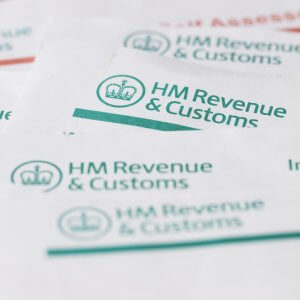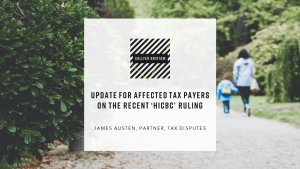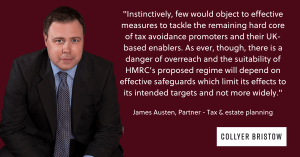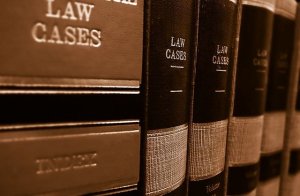- Private Wealth
- Tax disputes & investigations

Longer Reads
Collyer Bristow Annotations on the discovery assessments policy paper
Crown copyright acknowledged. Key comments and annotations on the discovery assessments published 27th October 2021.
11 minute read
Published 5 November 2021
Key information
- Specialisms
- Private Wealth
Policy paper
Discovery assessments
Published 27 October 2021
Who is likely to be affected
Individuals who incur certain tax charges (the High Income Child Benefit Charge (HICBC), those relating to Gift Aid Donations and a number of different pension charges) but fail to notify HMRC and fail to complete a Self Assessment tax return for the tax year in which the charge(s) arose. The measure confirms the longstanding basis on which HMRC can assess these charges and does not impose any additional liability.
Comment: The last sentence is untrue. In fact, the reality is the opposite – the Upper Tribunal’s decision in Wilkes confirmed that HMRC did not have power to use discovery assessments in HICBC cases. The fact that HMRC has been subject to a longstanding misunderstanding of the limits on its powers is irrelevant.
General description of the measure
Where individuals fail to report and pay certain tax charges to HMRC, existing tax legislation provides that HMRC may issue “discovery” assessments to recover the tax owed. This measure does not change this policy but makes a technical clarification to clarify the law to provide legal certainty and maintain the status quo.
Comment: This is untrue for the reason given above. There needs to be a distinction between HMRC’s policy and the proper exercise of its statutory powers. The “technical clarification” proposed is in fact a wholesale and retrospective reversal of the current legal position. Far from “maintain[ing] the status quo”, the proposed change turns it on its head by overturning the decision of the Upper Tribunal in Wilkes.
This part of the measure is introduced with retrospective effect for HICBC, Gift Aid and the pensions charges. It does not introduce any additional obligations or liabilities for customers. With prospective effect, the measure provides that discovery assessments may be used to recover any income tax or capital gains tax that ought to have been assessed but has not been assessed.
Comment: That a retrospective widening of HMRC’s statutory powers is being proposed to the detriment of (at least, we calculate) 168,838 taxpayers is remarkable. Whilst it is technically true, as HMRC says, that “[i]t does not introduce any additional obligations or liabilities”, the proposed change removes the ability of affected taxpayers to claim a reimbursement for tax paid pursuant to HMRC’s erroneous use of its discovery assessment powers. As the law currently stands, following the Upper Tribunal’s decision in Wilkes (and subject to HMRC’s forthcoming second appeal in the Court of Appeal), affected taxpayers would be able to appeal to the Tax Tribunal for HMRC’s discovery assessments to be set aside. That ability would be removed if the proposed legislation is passed.
Additionally, the measure also confirms that individuals chargeable to these income tax charges need to notify HMRC. This part of the measure is introduced with prospective effect.
Policy objective
This measure is designed to provide certainty that HMRC can use discovery assessments to assess certain tax charges where an individual has failed to notify HMRC that they are liable and has failed to complete a Self Assessment tax return. This will ensure that all individuals liable for these tax charges are treated in a fair and consistent way, and that individuals who fail to notify and report their liability to these charges cannot gain an unfair advantage over those who do.
Applying the measure both retrospectively and prospectively will affirm HMRC’s long held position and provide certainty for HMRC, taxpayers, and the tribunals about HMRC’s powers to recover tax in these circumstances.
Comment: There is no difficulty in the prospective element of the proposed measure: that part of HMRC’s policy objective is reasonable and unobjectionable (although the introduction in 2016 of s.28H TMA 1970 “simple assessments” already supplies the necessary powers). However, the retrospectivity is a wholesale departure from past practice and is extremely controversial; it is likely to be contested – including by litigation – by affected taxpayers and will increase still further the widespread criticism of the design of the HICBC and the manner of HMRC’s implementation and the associated legal costs.
With some notable and regrettable exceptions, retrospective changes to tax legislation – including in respect of HMRC’s powers – have been restricted to the most egregious cases of tax avoidance, and where the Government seeks to protect significant revenues for the Exchequer. In this case, the policy paper claims (implausibly) that the impact to the Exchequer will be “nil” – which raises the question as to why the change should be necessary at all. But we suspect that even if the Government amended the policy paper to publish the actual position for the Exchequer, the quantum of tax affected would be far too little to offer any justification for the measure.
Background to the measure
HICBC
In a recent case the Upper Tribunal found that HMRC did not have the power to recover an individual’s HICBC by issuing a discovery assessment under Section 29(1)(a) of the Taxes Management Act 1970 where that individual had failed to report their HICBC to HMRC and failed to file a tax return for the relevant tax year. The tribunal accepted that the individual was still liable to HICBC, but concluded that the assessments were not validly raised.
HMRC does not believe the judgment of the Upper Tribunal was correct and is appealing the decision to the Court of Appeal. In advance of that appeal, this measure will provide certainty that HMRC may recover HICBC through the issue of a discovery assessment.
The measure will ensure that individuals who do not report their HICBC liability to HMRC will still have to pay, and they will not have an unfair advantage over compliant individuals who report their HICBC to HMRC.
Comment: This is disingenuous – HMRC is not comparing like with like. We are not aware of cases where taxpayers deliberately evaded their liability for the HICBC by knowingly failing to make a tax return. Instead, those who failed to comply with their obligations did so because they were unaware of their need to file a self-assessment tax return. In many, if not most, cases, the taxpayer liable to pay the HICBC was not the person in receipt of Child Benefit. In some cases, the taxpayer had no parental responsibility for the children in question, and a few were not aware that Child Benefit was even being claimed by another person.
HMRC is absolutely right to exercise its powers to ensure that taxpayers are treated fairly. However, we consider that HMRC is mistaken in believing that the proposed change does so. Fairness requires that taxpayers in the same position must be treated in the same way. It is acknowledged that all taxpayers subject to the HICBC had a legal obligation to submit a self-assessment tax return to pay that charge. The fact that many affected taxpayers did not do so was because they were unaware of their obligation – a situation which only arose because of the poor design of the HICBC, which is the result of policy choices by Government.
Taxpayers who were made the subject of discovery assessments for unpaid HICBC amounts have not achieved an “unfair advantage” over those who properly submitted their returns to pay the charge: they are in a different position, because HMRC used an assessment power to recover the HICBC that was not open to it.
Gift Aid
Charities and community amateur sports clubs can claim a repayment of the tax that is treated as having been paid on the charitable donations they receive from taxpayers. However, if the donor has paid insufficient tax in the year to cover the tax being reclaimed, then that donor will incur a tax charge.
This measure provides certainty that HMRC may recover this charge through the issue of a section 29 discovery assessment.
Pension Charges
Under Finance Act 2004, the unauthorised payments charge and surcharge arise where unauthorised payments are made by a registered pension scheme to a scheme member. The recipient of the payment is liable to the tax. Further charges to income tax are imposed in the context of registered pension schemes: the lifetime allowance charge and the annual allowance charge.
Schedule 34 to the Finance Act 2004 provides for certain tax charges that normally apply in the context of registered pension schemes to apply in certain circumstances to members of certain non-UK pension schemes that are not registered pension schemes. Those charges include the unauthorised payments charge and surcharge, the lifetime allowance charge, the annual allowance charge, the short service refund lump sum charge and the special lump sum death benefits charge.
In addition to the above, the overseas transfer charge applies to some transfers to certain overseas pension schemes.
This measure provides certainty that HMRC may recover all of these charges through section 29 discovery assessment.
Comment: Whilst the Wilkes case did not concern pension charges, it became apparent in the preparations for the Upper Tribunal hearing in Wilkes that the decision in that case would also affect HMRC’s ability to issue discovery assessments in respect of pensions unauthorised payments and other similar free-standing charges. As with the HICBC issues, the proposed changes are only objectionable insofar as they are retrospective. HMRC claims that the proposed measure “provides certainty” that HMRC can issue discovery assessments for unauthorised payment charges, but the reality is that this “certainty” only comes as a result of reversing the law as it currently stands post-Wilkes.
Detailed proposal
Operative date
This measure will apply both prospectively and retrospectively. Although this measure applies retrospectively it does not introduce any new or additional obligations or liabilities; it simply maintains the widely accepted and understood position that existed until recent litigation called this into question.
Current law
Section 29(1)(a) of the Taxes Management Act 1970 provides that HMRC may issue discovery assessments.
Section 7 of the Taxes Management Act 1970 requires individuals to notify HMRC when they are chargeable to income tax or capital gains tax.
Section 30 of the Income Tax Act 2007 brings certain tax charges into the calculation of income tax liability.
HICBC
Section 681B of the Income Tax (Earnings and Pensions) Act 2003 provides the rules relating to liability for HICBC.
Pension Charges
The various pension charges are set out in the following legislation:
Sections 205, 206, 208, 209, 214, 227 & 244A of the Finance Act 2004; Registered Pension Schemes (Accounting and Assessment) Regulations 2005; Schedule 34 to the Finance Act 2004.
Gift Aid
Sections 424 and 520 of the Income Tax Act 2007 covers gift aid and the circumstances in which a tax charge may be due.
Proposed revisions
HMRC’s longstanding position is that the assessing provisions in Section 29(1)(a) of the Taxes Management Act 1970 may be used to recover tax charges arising on HICBC, Gift Aid, and certain pensions charges.
Comment: HMRC’s “longstanding position” is irrelevant – what matters is the proper extent of HMRC’s statutory powers, which the Upper Tribunal has determined do not extend to issuing s.29 Discovery Assessments in HICBC cases.
It sometimes happens that HMRC misunderstands its powers. One recent example, which was referred to in Wilkes, was s.34 TMA 1970: HMRC had always considered this to apply to self-assessments. That supposition was wrong and was corrected by the Upper Tribunal in R (on the application of Higgs) v HMRC [2015] UKUT 92 (TCC), following which s.34(3) was inserted by Finance Act 2016. That provision overturned the Upper Tribunal’s decision and put HMRC’s prior misunderstanding on a proper statutory basis. Crucially, and unlike the proposed measure here, s.34(3) did not have retrospective effect.
A recent case before the Upper Tribunal challenged HMRC’s use of that assessing provision to recover HICBC. The Upper Tribunal ruled against HMRC and that decision is subject to a further appeal by HMRC to the Court of Appeal.
The government will legislate in Finance Bill 21-22 to put beyond doubt that HMRC may use these discovery assessments to recover all of the above-mentioned tax charges.
This legislation will apply retrospectively to HICBC, Gift Aid and the pensions charges, in order to provide certainty to taxpayers and prevent unnecessary litigation costs. With prospective effect only, the measure provides that discovery assessments may be used to recover any income tax or capital gains tax that ought to have been assessed but has not been assessed.
The legislation will not apply retrospectively to those individuals who previously received a discovery assessment and:
- who submitted an appeal to HMRC, on the basis of the arguments considered by the upper tribunal, on or before 30 June 2021(the date at which the Upper Tribunal handed down its decision in the relevant case.); or
- whose appeal, made on or before 30 June 2021, has been stood over by the Tribunal pending the final outcome of the relevant litigation
These individuals will be able to pursue their appeals on the basis of the legislation as currently enacted. Those considering submitting a late appeal on the same grounds should consider if they have any prospect of success, as any new appeal would be on the basis of the legislation as retrospectively amended.
Comment: After the controversy surrounding the retrospective effect (or otherwise) of the so-called ‘Loan Charge’, it is refreshing that HMRC is being open here about the intentionally retrospective effect of the proposed measure. However, HMRC’s statements give no indication that they have taken into account the exceptional and controversial nature of the proposed change. Retrospective changes to tax legislation – including HMRC’s statutory powers – are very rare, and for good reason. Retrospective legislation fundamentally interferes with the rule of law and the administration of justice. It is a departure from the norm, and is normally used only in the most egregious tax avoidance cases. The use of retrospectivity here is a concerning development as it implies that HMRC is unwilling to consider itself constrained by the hitherto widely accepted rules of sound government. The risk is that if HMRC is successful in accumulating retrospective powers in this case, it will seek to do so in future in other inappropriate cases.
HMRC states that the legislation is intended to “prevent unnecessary litigation costs”. The litigation by affected taxpayers only arises because of HMRC’s use of discovery assessment powers not properly open to it. It is far from unnecessary to the many taxpayers caught up in the debacle.
Furthermore, if the legislation obtains Royal Assent in its current form, additional expensive and time-consuming litigation in the form of Judicial Review proceedings in the High Court become likely (possibly, together with further appeals to the higher courts). If taxpayers are successful in Judicial Review, the litigation in the Tax Tribunals remains inevitable. The measure will not achieve its intended cost-saving objective.
The comment that “[t]hose considering submitting a late appeal on the same grounds should consider if they have any prospect of success, as any new appeal would be on the basis of the legislation as retrospectively amended” is an extraordinary attempt to pressure potential appellants into giving up their claims to redress. It is surely inappropriate for HMRC to attempt to bring pressure to bear in this way on those prejudiced by its actions.
Section 7 of the Taxes Management Act 1970 will be revised, with prospective effect only, to confirm that individuals who are chargeable to the income tax charges listed in Section 30 of the Income Taxes Act 2007, need to notify chargeability to HMRC. The measure also makes a minor (prospective only) correction to the list of charges included in section 30 of the Income Tax Act 1970.
Summary of impacts
Exchequer impact (£m)
| 2021 to 2022 | 2022 to 2023 | 2023 to 2024 | 2024 to 2025 | 2025 to 2026 | 2026 to 2027 |
| nil | nil | nil | nil | nil | nil |
This measure is not expected to have an Exchequer impact.
Comment: This statement is inexplicable. If, as HMRC says, the proposed retrospective measure is to have no Exchequer impact, why is it being brought forward? The reality is that the measure would remove from (we estimate, at least 168,838) affected taxpayers their ability to seek reimbursement from HMRC for amounts of HICBC paid pursuant to discovery assessments which HMRC did not have power properly to issue.
If HMRC wishes to pursue this measure in the forthcoming Finance Bill, it should be required to amend its statement of the Exchequer impact in this policy statement to state the correct amounts, and to explain its methodology in calculating them.
To date, a major justification for retrospective tax legislation is that it will protect significant Exchequer revenue. Many commentators doubt the force of that argument, though it has undeniably received some judicial support. In this case, where the Exchequer impact is said to be “nil”, even that justification is unavailable to HMRC.
Economic impact
This measure is not expected to have any significant economic impacts.
The terms used in this section are defined in line with the Office for Budget Responsibility’s indirect effects process. This will apply where, for example, a measure affects inflation or growth. You can request further details regarding this measure at the email address listed below.
Impact on individuals, households and families
There is no expected impact on individuals and liability to HICBC, pensions and Gift Aid charges is unaffected. Payment and reporting processes are not affected by the measure, which affirms the law with regard to HMRC using the assessing provisions provided in Section 29 of the Taxes Management Act 1970 to recover tax liabilities arising through the HICBC, Gift Aid, and certain pensions charges. There is expected to be no impact on family formation, stability or breakdown.
Comment: It is not clear what methodology HMRC has adopted in making this statement. We are not aware that HMRC has captured data specifically on this question. Furthermore, we understand HMRC’s statement to be incorrect: anecdotal evidence abounds to suggest that mental health difficulties, financial distress, and family instability and breakdown have all resulted from the imposition of the HICBC and the manner of HMRC’s discovery assessment and penalty policies. It is well known – and ought to be uncontroversial – that financial stress is one of the major causes of deteriorations in mental health and relationship breakdowns (see here, here, and here, for example). Affected taxpayers have told us that they have been pressured by HMRC into taking unaffordable borrowings to repay HICBC discovery assessments. This controversial measure is therefore only likely to increase the prevalence of mental health difficulties and relationship breakdown. As a result, HMRC’s suggestion to the contrary is unlikely to have been made by reference to the relevant studies and public statements by affected taxpayers.
However, the retrospective legislation will not apply to a small number of individuals who either: submitted an appeal to HMRC, on the basis of the arguments considered by the Upper Tribunal, on or before the 30 June 2021; or whose appeal, made on or before 30 June 2021, has been stood over by the Tribunal pending the final outcome in the relevant case. These individuals also remain liable to the tax in question, but the validity of HMRC’s use of discovery assessments to recover that tax will be determined by the continuing litigation.
Comment: Rather than reduce the unfairness of the measure, the decision to exempt the 399 cases currently listed before the Tax Tribunal from its retrospective effect actually introduces more unfairness. This is because it makes a new distinction between two groups of taxpayers who are currently in the same position, i.e. the 399 cases pending who will have the benefit of the current law, and the outcome of which will follow Wilkes, and all other affected taxpayers, who will be denied a right of appeal. By not treating like cases in the same way, the proposed measure fails to deal fairly with taxpayers.
Equalities impacts
There is expected to be no impact on groups sharing protected characteristics.
Comment: One of the many criticisms of the HICBC and HMRC’s approach to its collection is that it disproportionately affects women, who constitute 87% of child benefit claimants. The glib assertion that the proposed measure has no income on women is a further example of HMRC failing to understand its indirect discriminatory effect.
Impact on business including civil society organisations
There is expected to be no impact on business or civil society organisations.
Operational impact (£m) (HMRC or other)
There is no operational impact. HMRC systems will remain unchanged. This measure is intended to affirm HMRC’s application of tax law.
Other impacts
Other impacts have been considered and none have been identified.
Monitoring and evaluation
This measure will be monitored through information collected from HMRC’s systems including data on assessments issued, appeals and reviews.
Further advice
If you have any questions about this change, please contact Peter Nicholls on 03000 556776 or email: peter.nicholls@hmrc.gov.uk.
Related content
Longer Reads
Collyer Bristow Annotations on the discovery assessments policy paper
Crown copyright acknowledged. Key comments and annotations on the discovery assessments published 27th October 2021.
Published 5 November 2021
Associated sectors / services
Authors
Policy paper
Discovery assessments
Published 27 October 2021
Who is likely to be affected
Individuals who incur certain tax charges (the High Income Child Benefit Charge (HICBC), those relating to Gift Aid Donations and a number of different pension charges) but fail to notify HMRC and fail to complete a Self Assessment tax return for the tax year in which the charge(s) arose. The measure confirms the longstanding basis on which HMRC can assess these charges and does not impose any additional liability.
Comment: The last sentence is untrue. In fact, the reality is the opposite – the Upper Tribunal’s decision in Wilkes confirmed that HMRC did not have power to use discovery assessments in HICBC cases. The fact that HMRC has been subject to a longstanding misunderstanding of the limits on its powers is irrelevant.
General description of the measure
Where individuals fail to report and pay certain tax charges to HMRC, existing tax legislation provides that HMRC may issue “discovery” assessments to recover the tax owed. This measure does not change this policy but makes a technical clarification to clarify the law to provide legal certainty and maintain the status quo.
Comment: This is untrue for the reason given above. There needs to be a distinction between HMRC’s policy and the proper exercise of its statutory powers. The “technical clarification” proposed is in fact a wholesale and retrospective reversal of the current legal position. Far from “maintain[ing] the status quo”, the proposed change turns it on its head by overturning the decision of the Upper Tribunal in Wilkes.
This part of the measure is introduced with retrospective effect for HICBC, Gift Aid and the pensions charges. It does not introduce any additional obligations or liabilities for customers. With prospective effect, the measure provides that discovery assessments may be used to recover any income tax or capital gains tax that ought to have been assessed but has not been assessed.
Comment: That a retrospective widening of HMRC’s statutory powers is being proposed to the detriment of (at least, we calculate) 168,838 taxpayers is remarkable. Whilst it is technically true, as HMRC says, that “[i]t does not introduce any additional obligations or liabilities”, the proposed change removes the ability of affected taxpayers to claim a reimbursement for tax paid pursuant to HMRC’s erroneous use of its discovery assessment powers. As the law currently stands, following the Upper Tribunal’s decision in Wilkes (and subject to HMRC’s forthcoming second appeal in the Court of Appeal), affected taxpayers would be able to appeal to the Tax Tribunal for HMRC’s discovery assessments to be set aside. That ability would be removed if the proposed legislation is passed.
Additionally, the measure also confirms that individuals chargeable to these income tax charges need to notify HMRC. This part of the measure is introduced with prospective effect.
Policy objective
This measure is designed to provide certainty that HMRC can use discovery assessments to assess certain tax charges where an individual has failed to notify HMRC that they are liable and has failed to complete a Self Assessment tax return. This will ensure that all individuals liable for these tax charges are treated in a fair and consistent way, and that individuals who fail to notify and report their liability to these charges cannot gain an unfair advantage over those who do.
Applying the measure both retrospectively and prospectively will affirm HMRC’s long held position and provide certainty for HMRC, taxpayers, and the tribunals about HMRC’s powers to recover tax in these circumstances.
Comment: There is no difficulty in the prospective element of the proposed measure: that part of HMRC’s policy objective is reasonable and unobjectionable (although the introduction in 2016 of s.28H TMA 1970 “simple assessments” already supplies the necessary powers). However, the retrospectivity is a wholesale departure from past practice and is extremely controversial; it is likely to be contested – including by litigation – by affected taxpayers and will increase still further the widespread criticism of the design of the HICBC and the manner of HMRC’s implementation and the associated legal costs.
With some notable and regrettable exceptions, retrospective changes to tax legislation – including in respect of HMRC’s powers – have been restricted to the most egregious cases of tax avoidance, and where the Government seeks to protect significant revenues for the Exchequer. In this case, the policy paper claims (implausibly) that the impact to the Exchequer will be “nil” – which raises the question as to why the change should be necessary at all. But we suspect that even if the Government amended the policy paper to publish the actual position for the Exchequer, the quantum of tax affected would be far too little to offer any justification for the measure.
Background to the measure
HICBC
In a recent case the Upper Tribunal found that HMRC did not have the power to recover an individual’s HICBC by issuing a discovery assessment under Section 29(1)(a) of the Taxes Management Act 1970 where that individual had failed to report their HICBC to HMRC and failed to file a tax return for the relevant tax year. The tribunal accepted that the individual was still liable to HICBC, but concluded that the assessments were not validly raised.
HMRC does not believe the judgment of the Upper Tribunal was correct and is appealing the decision to the Court of Appeal. In advance of that appeal, this measure will provide certainty that HMRC may recover HICBC through the issue of a discovery assessment.
The measure will ensure that individuals who do not report their HICBC liability to HMRC will still have to pay, and they will not have an unfair advantage over compliant individuals who report their HICBC to HMRC.
Comment: This is disingenuous – HMRC is not comparing like with like. We are not aware of cases where taxpayers deliberately evaded their liability for the HICBC by knowingly failing to make a tax return. Instead, those who failed to comply with their obligations did so because they were unaware of their need to file a self-assessment tax return. In many, if not most, cases, the taxpayer liable to pay the HICBC was not the person in receipt of Child Benefit. In some cases, the taxpayer had no parental responsibility for the children in question, and a few were not aware that Child Benefit was even being claimed by another person.
HMRC is absolutely right to exercise its powers to ensure that taxpayers are treated fairly. However, we consider that HMRC is mistaken in believing that the proposed change does so. Fairness requires that taxpayers in the same position must be treated in the same way. It is acknowledged that all taxpayers subject to the HICBC had a legal obligation to submit a self-assessment tax return to pay that charge. The fact that many affected taxpayers did not do so was because they were unaware of their obligation – a situation which only arose because of the poor design of the HICBC, which is the result of policy choices by Government.
Taxpayers who were made the subject of discovery assessments for unpaid HICBC amounts have not achieved an “unfair advantage” over those who properly submitted their returns to pay the charge: they are in a different position, because HMRC used an assessment power to recover the HICBC that was not open to it.
Gift Aid
Charities and community amateur sports clubs can claim a repayment of the tax that is treated as having been paid on the charitable donations they receive from taxpayers. However, if the donor has paid insufficient tax in the year to cover the tax being reclaimed, then that donor will incur a tax charge.
This measure provides certainty that HMRC may recover this charge through the issue of a section 29 discovery assessment.
Pension Charges
Under Finance Act 2004, the unauthorised payments charge and surcharge arise where unauthorised payments are made by a registered pension scheme to a scheme member. The recipient of the payment is liable to the tax. Further charges to income tax are imposed in the context of registered pension schemes: the lifetime allowance charge and the annual allowance charge.
Schedule 34 to the Finance Act 2004 provides for certain tax charges that normally apply in the context of registered pension schemes to apply in certain circumstances to members of certain non-UK pension schemes that are not registered pension schemes. Those charges include the unauthorised payments charge and surcharge, the lifetime allowance charge, the annual allowance charge, the short service refund lump sum charge and the special lump sum death benefits charge.
In addition to the above, the overseas transfer charge applies to some transfers to certain overseas pension schemes.
This measure provides certainty that HMRC may recover all of these charges through section 29 discovery assessment.
Comment: Whilst the Wilkes case did not concern pension charges, it became apparent in the preparations for the Upper Tribunal hearing in Wilkes that the decision in that case would also affect HMRC’s ability to issue discovery assessments in respect of pensions unauthorised payments and other similar free-standing charges. As with the HICBC issues, the proposed changes are only objectionable insofar as they are retrospective. HMRC claims that the proposed measure “provides certainty” that HMRC can issue discovery assessments for unauthorised payment charges, but the reality is that this “certainty” only comes as a result of reversing the law as it currently stands post-Wilkes.
Detailed proposal
Operative date
This measure will apply both prospectively and retrospectively. Although this measure applies retrospectively it does not introduce any new or additional obligations or liabilities; it simply maintains the widely accepted and understood position that existed until recent litigation called this into question.
Current law
Section 29(1)(a) of the Taxes Management Act 1970 provides that HMRC may issue discovery assessments.
Section 7 of the Taxes Management Act 1970 requires individuals to notify HMRC when they are chargeable to income tax or capital gains tax.
Section 30 of the Income Tax Act 2007 brings certain tax charges into the calculation of income tax liability.
HICBC
Section 681B of the Income Tax (Earnings and Pensions) Act 2003 provides the rules relating to liability for HICBC.
Pension Charges
The various pension charges are set out in the following legislation:
Sections 205, 206, 208, 209, 214, 227 & 244A of the Finance Act 2004; Registered Pension Schemes (Accounting and Assessment) Regulations 2005; Schedule 34 to the Finance Act 2004.
Gift Aid
Sections 424 and 520 of the Income Tax Act 2007 covers gift aid and the circumstances in which a tax charge may be due.
Proposed revisions
HMRC’s longstanding position is that the assessing provisions in Section 29(1)(a) of the Taxes Management Act 1970 may be used to recover tax charges arising on HICBC, Gift Aid, and certain pensions charges.
Comment: HMRC’s “longstanding position” is irrelevant – what matters is the proper extent of HMRC’s statutory powers, which the Upper Tribunal has determined do not extend to issuing s.29 Discovery Assessments in HICBC cases.
It sometimes happens that HMRC misunderstands its powers. One recent example, which was referred to in Wilkes, was s.34 TMA 1970: HMRC had always considered this to apply to self-assessments. That supposition was wrong and was corrected by the Upper Tribunal in R (on the application of Higgs) v HMRC [2015] UKUT 92 (TCC), following which s.34(3) was inserted by Finance Act 2016. That provision overturned the Upper Tribunal’s decision and put HMRC’s prior misunderstanding on a proper statutory basis. Crucially, and unlike the proposed measure here, s.34(3) did not have retrospective effect.
A recent case before the Upper Tribunal challenged HMRC’s use of that assessing provision to recover HICBC. The Upper Tribunal ruled against HMRC and that decision is subject to a further appeal by HMRC to the Court of Appeal.
The government will legislate in Finance Bill 21-22 to put beyond doubt that HMRC may use these discovery assessments to recover all of the above-mentioned tax charges.
This legislation will apply retrospectively to HICBC, Gift Aid and the pensions charges, in order to provide certainty to taxpayers and prevent unnecessary litigation costs. With prospective effect only, the measure provides that discovery assessments may be used to recover any income tax or capital gains tax that ought to have been assessed but has not been assessed.
The legislation will not apply retrospectively to those individuals who previously received a discovery assessment and:
- who submitted an appeal to HMRC, on the basis of the arguments considered by the upper tribunal, on or before 30 June 2021(the date at which the Upper Tribunal handed down its decision in the relevant case.); or
- whose appeal, made on or before 30 June 2021, has been stood over by the Tribunal pending the final outcome of the relevant litigation
These individuals will be able to pursue their appeals on the basis of the legislation as currently enacted. Those considering submitting a late appeal on the same grounds should consider if they have any prospect of success, as any new appeal would be on the basis of the legislation as retrospectively amended.
Comment: After the controversy surrounding the retrospective effect (or otherwise) of the so-called ‘Loan Charge’, it is refreshing that HMRC is being open here about the intentionally retrospective effect of the proposed measure. However, HMRC’s statements give no indication that they have taken into account the exceptional and controversial nature of the proposed change. Retrospective changes to tax legislation – including HMRC’s statutory powers – are very rare, and for good reason. Retrospective legislation fundamentally interferes with the rule of law and the administration of justice. It is a departure from the norm, and is normally used only in the most egregious tax avoidance cases. The use of retrospectivity here is a concerning development as it implies that HMRC is unwilling to consider itself constrained by the hitherto widely accepted rules of sound government. The risk is that if HMRC is successful in accumulating retrospective powers in this case, it will seek to do so in future in other inappropriate cases.
HMRC states that the legislation is intended to “prevent unnecessary litigation costs”. The litigation by affected taxpayers only arises because of HMRC’s use of discovery assessment powers not properly open to it. It is far from unnecessary to the many taxpayers caught up in the debacle.
Furthermore, if the legislation obtains Royal Assent in its current form, additional expensive and time-consuming litigation in the form of Judicial Review proceedings in the High Court become likely (possibly, together with further appeals to the higher courts). If taxpayers are successful in Judicial Review, the litigation in the Tax Tribunals remains inevitable. The measure will not achieve its intended cost-saving objective.
The comment that “[t]hose considering submitting a late appeal on the same grounds should consider if they have any prospect of success, as any new appeal would be on the basis of the legislation as retrospectively amended” is an extraordinary attempt to pressure potential appellants into giving up their claims to redress. It is surely inappropriate for HMRC to attempt to bring pressure to bear in this way on those prejudiced by its actions.
Section 7 of the Taxes Management Act 1970 will be revised, with prospective effect only, to confirm that individuals who are chargeable to the income tax charges listed in Section 30 of the Income Taxes Act 2007, need to notify chargeability to HMRC. The measure also makes a minor (prospective only) correction to the list of charges included in section 30 of the Income Tax Act 1970.
Summary of impacts
Exchequer impact (£m)
| 2021 to 2022 | 2022 to 2023 | 2023 to 2024 | 2024 to 2025 | 2025 to 2026 | 2026 to 2027 |
| nil | nil | nil | nil | nil | nil |
This measure is not expected to have an Exchequer impact.
Comment: This statement is inexplicable. If, as HMRC says, the proposed retrospective measure is to have no Exchequer impact, why is it being brought forward? The reality is that the measure would remove from (we estimate, at least 168,838) affected taxpayers their ability to seek reimbursement from HMRC for amounts of HICBC paid pursuant to discovery assessments which HMRC did not have power properly to issue.
If HMRC wishes to pursue this measure in the forthcoming Finance Bill, it should be required to amend its statement of the Exchequer impact in this policy statement to state the correct amounts, and to explain its methodology in calculating them.
To date, a major justification for retrospective tax legislation is that it will protect significant Exchequer revenue. Many commentators doubt the force of that argument, though it has undeniably received some judicial support. In this case, where the Exchequer impact is said to be “nil”, even that justification is unavailable to HMRC.
Economic impact
This measure is not expected to have any significant economic impacts.
The terms used in this section are defined in line with the Office for Budget Responsibility’s indirect effects process. This will apply where, for example, a measure affects inflation or growth. You can request further details regarding this measure at the email address listed below.
Impact on individuals, households and families
There is no expected impact on individuals and liability to HICBC, pensions and Gift Aid charges is unaffected. Payment and reporting processes are not affected by the measure, which affirms the law with regard to HMRC using the assessing provisions provided in Section 29 of the Taxes Management Act 1970 to recover tax liabilities arising through the HICBC, Gift Aid, and certain pensions charges. There is expected to be no impact on family formation, stability or breakdown.
Comment: It is not clear what methodology HMRC has adopted in making this statement. We are not aware that HMRC has captured data specifically on this question. Furthermore, we understand HMRC’s statement to be incorrect: anecdotal evidence abounds to suggest that mental health difficulties, financial distress, and family instability and breakdown have all resulted from the imposition of the HICBC and the manner of HMRC’s discovery assessment and penalty policies. It is well known – and ought to be uncontroversial – that financial stress is one of the major causes of deteriorations in mental health and relationship breakdowns (see here, here, and here, for example). Affected taxpayers have told us that they have been pressured by HMRC into taking unaffordable borrowings to repay HICBC discovery assessments. This controversial measure is therefore only likely to increase the prevalence of mental health difficulties and relationship breakdown. As a result, HMRC’s suggestion to the contrary is unlikely to have been made by reference to the relevant studies and public statements by affected taxpayers.
However, the retrospective legislation will not apply to a small number of individuals who either: submitted an appeal to HMRC, on the basis of the arguments considered by the Upper Tribunal, on or before the 30 June 2021; or whose appeal, made on or before 30 June 2021, has been stood over by the Tribunal pending the final outcome in the relevant case. These individuals also remain liable to the tax in question, but the validity of HMRC’s use of discovery assessments to recover that tax will be determined by the continuing litigation.
Comment: Rather than reduce the unfairness of the measure, the decision to exempt the 399 cases currently listed before the Tax Tribunal from its retrospective effect actually introduces more unfairness. This is because it makes a new distinction between two groups of taxpayers who are currently in the same position, i.e. the 399 cases pending who will have the benefit of the current law, and the outcome of which will follow Wilkes, and all other affected taxpayers, who will be denied a right of appeal. By not treating like cases in the same way, the proposed measure fails to deal fairly with taxpayers.
Equalities impacts
There is expected to be no impact on groups sharing protected characteristics.
Comment: One of the many criticisms of the HICBC and HMRC’s approach to its collection is that it disproportionately affects women, who constitute 87% of child benefit claimants. The glib assertion that the proposed measure has no income on women is a further example of HMRC failing to understand its indirect discriminatory effect.
Impact on business including civil society organisations
There is expected to be no impact on business or civil society organisations.
Operational impact (£m) (HMRC or other)
There is no operational impact. HMRC systems will remain unchanged. This measure is intended to affirm HMRC’s application of tax law.
Other impacts
Other impacts have been considered and none have been identified.
Monitoring and evaluation
This measure will be monitored through information collected from HMRC’s systems including data on assessments issued, appeals and reviews.
Further advice
If you have any questions about this change, please contact Peter Nicholls on 03000 556776 or email: peter.nicholls@hmrc.gov.uk.
Associated sectors / services
- Private Wealth
- Tax disputes & investigations
Authors
Need some more information? Make an enquiry below.
Subscribe
Please add your details and your areas of interest below
Article contributor
James
AustenPartner
Specialising in UK trusts, tax & estate planning, Private wealth, Tax disputes & investigations and Trusts & Inheritance disputes
Enjoy reading our articles? why not subscribe to notifications so you’ll never miss one?
Subscribe to our articlesMessage us on WhatsApp (calling not available)
Please note that Collyer Bristow provides this service during office hours for general information and enquiries only and that no legal or other professional advice will be provided over the WhatsApp platform. Please also note that if you choose to use this platform your personal data is likely to be processed outside the UK and EEA, including in the US. Appropriate legal or other professional opinion should be taken before taking or omitting to take any action in respect of any specific problem. Collyer Bristow LLP accepts no liability for any loss or damage which may arise from reliance on information provided. All information will be deleted immediately upon completion of a conversation.
Close
















































































